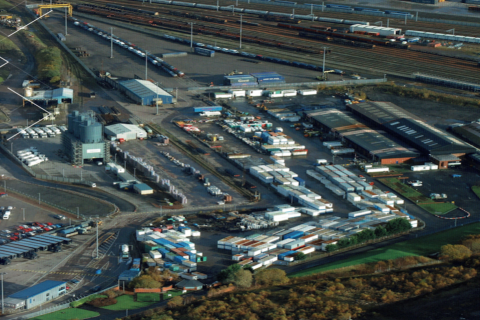Freightliner means beans for Kraft Heinz

UK operator Freightliner has been running trials moving foodstuffs for multinational producer Kraft Heinz. The collaboration supports an initiative to connect west and east coast ports called the Liverpool-Humber Optimisation of Freight Transport (LHOFT). The project is being overseen and sponsored by Innovate UK, the UK non-departmental public body operating as part of the government’s United Kingdom Research and Innovation organisation.
The multinational conglomerate, most famous for their cheese triangles and their bakes beans, has been working with their rail freight partners Freightliner to develop an intermodal rail freight solution for the haulage of products from Elst in the central Netherlands, to the Kraft Heinz National Distribution Centre at Wigan in north west England.
Night train to Wigan
The Innovate UK sponsored Liverpool-Humber Optimisation of Freight Transport (LHOFT) project has brought together partners Kraft Heinz, the University of Hull, and consultants Oxford Rail Strategies. They have been working together to develop cost-effective and food-secure means to deliver products from Elst to Wigan, by rail. The currently employed options are by road, and sea, which is slower, and air freight, which is expensive and increasingly environmentally undesirable.
Following consultation with operator Freightliner, and the UK infrastructure agency Network Rail, a trial train ran recently to evaluate the feasibility of delivering Kraft Heinz products by rail to Wigan. Operating overnight, the trial was considered a complete success and Kraft Heinz will now be considering whether to build on the findings of the trial going forward.
Beans means trains
A key element of the trial is the reduction of carbon, and the opportunity to move towards meeting green-economy targets on both sides of the English Channel. “Freightliner is always at the forefront of developing innovative, bespoke solutions to allow more freight to be moved by rail and all the associated environmental benefits that brings”, said Emma Dempsey, chief commercial officer for UK/Europe region companies at Genesee & Wyoming, the American-owned parent of Freightliner. “As the largest operator of carbon neutral traction, we are continually developing solutions to deliver decarbonisation targets, working in collaboration with business partners and customers, and we were delighted to be part of the team to trial this potential modal shift to rail”.

The academic research partners, the University of Hull Logistics Institute, has experience working with the rail industry to develop technological solutions. Their director, Amar Ramudhin, said the university is at the forefront of accelerating a net zero future economy. “The collaborative transport modelling and optimisation platform developed by the University’s Logistics Institute is based on academic insight”, he said. “It has played a key role in the LHOFT project, enriching the analysis that is used to visualise, interpret and compare freight movement options”, said Ramudhin. “This allows objective evaluation of the freight movement options. For example the Wigan rail route opens up new opportunities for goods owners and service providers to collaborate to develop new, lower carbon transport routes.”
How to Kraft a routing
The time-critical and reliability requirements for foodstuffs lend themselves to the parameters of the LHOFT project. The partners say that it uniquely brings together key stakeholders in the rail freight industries with the aim of establishing an east-west freight transport corridor in the north of the UK. Given the north-south radial nature of transport communications in the UK, any journey that cuts across those spokes requires meticulous planning.

This spoke-defying corridor will link Liverpool in the west to the Humber port complex in the east, and helps answer the stated aims of bodies like Transport for the North. News of the trials come as a shot in the arm for TfN, which is still reeling from announced budget cuts.
Moves to lower congestion
The ambition of LHOFT is to reduce UK land transport of 100 million miles (160 million kilometres) of freight transport annually, thus lowering congestion and carbon emissions. Summing up, Karla Jakeman, who is innovation lead for connected transport at Innovate UK said this is a very positive development of the project. “It is always exciting when projects can demonstrate innovation in practice”, she said. “I am looking forward to watching how this develops in the future.”
You just read one of our premium articles free of charge
Want full access? Take advantage of our exclusive offer





